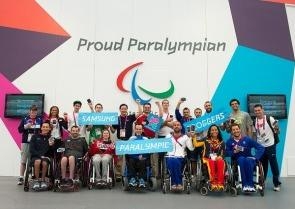UK attitudes towards disability still bad say charities
On the first anniversary of the Paralympic Games, disability charity Scope has warned its legacy “hangs in the balance”. There was a widely perceived positive change in attitudes towards disabilities in the immediate aftermath of the London 2012 Paralympic Games, but a recent survey carried out on behalf of Scope shows this has disappeared, and perhaps even been reversed into a negative shift.
A post on the charity’s website said: “Short-term improvements in public attitudes, sport and community involvement are being undermined by ‘scrounger rhetoric’, a crisis in living standards and a squeeze on local care.”
A staggering 81% of those polled by Opinium said attitudes towards them had not improved, with as many as 22% saying they had actually deteriorated.
In addition, nearly one in five of those polled had faced hostile or threatening behaviour, and in some cases been attacked, just because of their disability.
The charity has published anecdotal accounts of abuse suffered by disabled people on their website, with one person saying: “I’m leaning on my crutches by the broccoli when a lady in her late 50s walks up behind me shoves me hard into the broccoli box – face first – and calls me a disability scrounging unrepeatable in front of my children.”
Scope also pointed to what it called a “crisis in living standards for disabled people”, with 16% of those asked by Ipsos MORI saying that they could not keep up with the rising costs of living. Additionally, it is estimated that two thirds of those affected by the bedroom tax are disabled.
Of those polled who felt attitudes towards disabled people had got worse, 84% said they believed it was as a result of the “benefit scrounger” rhetoric from politicians and the media.
Separate polling by research blog Inequalities found that the average person polled believed that 34% of disability claimants were claiming falsely, whereas official figures combining both fraud and customer error show this figure is only 1.2% − demonstrating how hugely inaccurate the public perception of disability benefit claimants is.
The Chair of Scope, Alice Maynard, said: “If the Government wants to make its [Paralympic Games] legacy ambitions a reality – and make this country a better place for disabled people – it needs to tackle the crisis in social care, re-think its cuts to vital financial support and call a halt to benefits scrounger rhetoric.”
Joe Turnbull
ที่มา: http://www.theupcoming.co.uk/2013/08/29/uk-attitudes-towards-disability-still-bad-say-charities%E2%80%8F/ (ขนาดไฟล์: 162)
วันที่โพสต์: 17/09/2556 เวลา 03:47:47 
![]()
![]()
แสดงความคิดเห็น
รายละเอียดกระทู้
On the first anniversary of the Paralympic Games, disability charity Scope has warned its legacy “hangs in the balance”. There was a widely perceived positive change in attitudes towards disabilities in the immediate aftermath of the London 2012 Paralympic Games, but a recent survey carried out on behalf of Scope shows this has disappeared, and perhaps even been reversed into a negative shift. A year on from the Paralympics, 81% of disabled people polled said attitudes had failed to improve. Photo: Samsung Tomorrow. A post on the charity’s website said: “Short-term improvements in public attitudes, sport and community involvement are being undermined by ‘scrounger rhetoric’, a crisis in living standards and a squeeze on local care.” A staggering 81% of those polled by Opinium said attitudes towards them had not improved, with as many as 22% saying they had actually deteriorated. In addition, nearly one in five of those polled had faced hostile or threatening behaviour, and in some cases been attacked, just because of their disability. The charity has published anecdotal accounts of abuse suffered by disabled people on their website, with one person saying: “I’m leaning on my crutches by the broccoli when a lady in her late 50s walks up behind me shoves me hard into the broccoli box – face first – and calls me a disability scrounging unrepeatable in front of my children.” Scope also pointed to what it called a “crisis in living standards for disabled people”, with 16% of those asked by Ipsos MORI saying that they could not keep up with the rising costs of living. Additionally, it is estimated that two thirds of those affected by the bedroom tax are disabled. Of those polled who felt attitudes towards disabled people had got worse, 84% said they believed it was as a result of the “benefit scrounger” rhetoric from politicians and the media. Separate polling by research blog Inequalities found that the average person polled believed that 34% of disability claimants were claiming falsely, whereas official figures combining both fraud and customer error show this figure is only 1.2% − demonstrating how hugely inaccurate the public perception of disability benefit claimants is. The Chair of Scope, Alice Maynard, said: “If the Government wants to make its legacy ambitions a reality – and make this country a better place for disabled people – it needs to tackle the crisis in social care, re-think its cuts to vital financial support and call a halt to benefits scrounger rhetoric.” Joe Turnbull
จัดฟอร์แม็ตข้อความและมัลติมีเดีย
รายละเอียดการใส่ ลิงค์ รูปภาพ วิดีโอ เพลง (Soundcloud)


